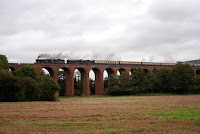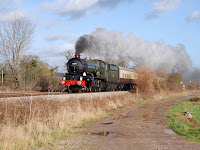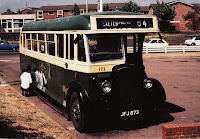Model Trains
Everything on model trains, model railroads, model railways, locomotives, model train layouts, scenery, wiring, DCC and more. Enjoy the world's best hobby... model railroading!
John from the UK has sent in this article for publication:
All my locos are either Hornby or Bachmann bought new. There are three exceptions to this:-
1. Airfix GWR Castle class 4-6-0. Castle class locos were the front line express passenger locos of the GWR from 1923 until the end of steam. In the nineteen thirties the ‘Cheltenham Flyer’ was declared The Fastest Train in The World and held the title until 1937. The fastest run of all in June 1932 was hauled by no. 5006 Tregenna Castle (It was always hauled by a Castle Class engine) in which the 77.3 mile journey was covered start to stop in under 57 minutes, an AVERAGE speed of 81.7 mph. A total of 165 Castle class locos were built, the last 38 after Nationalisation in 1948. No fewer than seven Castles have been saved for preservation. Recently no. 5043 Earl of Mount Edgecombe was sharing a 500 ton load in 14 bogies with Tornado no. 60163, the new build Peppercorn Pacific (LNER) over the Devon banks. Here there are sections as steep as 1 in 30. This special train was actually delayed by a failing diesel HST125. The 125 mph modern train was struggling with a deposit of wet autumn leaves on the track. The steam locos had dry sanding gear and made light of it.
My model is an excellent loco with tender drive but I may have to add weight to the main loco body because there is some skidding of the main driving wheels. The pulling ability of this loco is very good and it has taken 20 bogies away no trouble.
2. Airfix GWR 61xx ‘Prairie’ 2-6-2T heavy suburban passenger tank loco. This pulls fine but runs unevenly and I have never succeeded in finding out why. I have bought a new chassis kit, wheels, motor and gearbox from ‘Comet’ Models and will build this new chassis and fit when I can find the time.
3. Scratchbuilt Southern Railway general purpose tank engine type Drummond M7 0-4-4T. These engines were used on empty stock train duties taking empty coaches back to Nine Elms depot for cleaning and servicing. M7’s also brought serviced stock back into Waterloo from Nine Elms Yard in preparation for departing trains for Bournemouth, Weymouth and the far south west (Devon and Cornwall). Some M7 locos were fitted with special gear for running on “push-pull” two coach branch line trains in which the driver operated the train from a set of controls in the end compartment of the second coach. This was done to save the need to “run round”. Thus the crew were together on the footplate when running in the forward direction only. This was done on the Swanage and Seaton branches especially. My model hauls a train of ten bogies or thirty goods wagons and is a perfect runner.
I believe the problem with the Prairie tank is too much side play on the leading and trailing driving wheel axles causing jamming of the coupling and connecting rods. If I can put in washers under the driving wheels on these axles it may cure the problem but I have been told that the Airfix chassis leaves much to be desired and I should build a new chassis. This was a new loco but Airfix no longer exist so I have to deal with it myself.
Comment below.
The long awaited release is here. Two new ebooks out now –
1. Model Train Scenery and Layout Construction Ideas
2. 303 Model Railroading Answers
Read full details on what is included in each one at Model Train Layouts.
They are the perfect follow-ons to my best-selling Model Train Help ebook.
Jody will be very interested in one of the sections in my new ebook being released soon as it deals with micro layouts (among other things). However, in the meantime, Jody has a question for readers:
“I am a miniaturest working in very small scale. I would like to make a train layout in the smallest possible scale. How tall are the houses, etc for z scale? I cant seem to find any measurements for z scale trains, and I have been unable to see one for myself. Also, do they make any working trains in dollhouse scale? I am guessing this scale would be about a half inch for the engine, but I’m not sure. Anybody out there who can help? Thanks.”
Add your suggestions or comments below.
Remember if you see something you like on this blog and you would like to share it with friends in the hobby then your welcome to use the facebook and twitter buttons bellow each posting.
Also if you have a website you make like to add the RSS feed in the top right hand column. To add a live feed of this blog to your own model train website.
Andy wants guidance from readers to convert his Baldwin Shark loco to DCC. Andy asks:
“I would like to convert my ModelPower Baldwin Shark to DCC. It has a large can type motor with two wires and the headlight wire exposed. I only want power and lighting; I don’t need sound. Any help I can get to do this will be greatly appreciated.”
Pictured is the Bachmann HO Scale DCC Pennsylvania RR Baldwin RF-16 A Unit Shark Diesel Locomotive from Bachmann. The distinctive nose contours of Baldwin’s RF-16 diesels earned them the name “Shark”. These powerful freight hauling locomotives were built in the early 1950s and saw service hauling coal, ore and other heavy loads.
John has sent in this wonderful contribution that I’m sure everyone will enjoy:
 The photos were taken by my friend Ian Cook who is making his name as a railway artist. I have seen some of Ian’s paintings and you can almost catch a whiff of that unmistakeable smell of smoke, steam and hot steam oil.
The photos were taken by my friend Ian Cook who is making his name as a railway artist. I have seen some of Ian’s paintings and you can almost catch a whiff of that unmistakeable smell of smoke, steam and hot steam oil.
The locomotive is LNER no. 2001 Cock ‘o the North, Gresley P2 class 2-8-2, a very powerful machine indeed.
Doubtless you recognise the location  – it is, of course, the mighty Forth Bridge in Scotland. Sadly none of the P2 class were saved although the enthusiasts have begun to build new. The Peppercorn pacific Tornado no. 60163 is the first of these new generation locos and because it uses modern construction techniques like a welded boiler and roller bearings in place of white metal journals, is proving itself a great mainline contender.
– it is, of course, the mighty Forth Bridge in Scotland. Sadly none of the P2 class were saved although the enthusiasts have begun to build new. The Peppercorn pacific Tornado no. 60163 is the first of these new generation locos and because it uses modern construction techniques like a welded boiler and roller bearings in place of white metal journals, is proving itself a great mainline contender.
 There are about eight Halls still running or in overhaul and about six Castles. All will run from time to time when in possession of a boiler certificate. Steam locomotive operation on “Heritage” trains with fare paying passengers on board is a tremendous business now here in the UK. British Rail have realised the earning potential of steam trains and all the old barriers to operation by restored steam have been dropped.
Ian used to own the heritage Daimler bus pictured here.
There are about eight Halls still running or in overhaul and about six Castles. All will run from time to time when in possession of a boiler certificate. Steam locomotive operation on “Heritage” trains with fare paying passengers on board is a tremendous business now here in the UK. British Rail have realised the earning potential of steam trains and all the old barriers to operation by restored steam have been dropped.
Ian used to own the heritage Daimler bus pictured here.
Share this with your friends on Facebook and Twitter. Use the buttons below.
Recommend model train ebook.
Nel wants some advice from experienced model railroaders and asks:
“I am lookling for a source of marker lights for the front of a locomotive boiler and piping details for under each side of cab for Williams by Bachman N & W J as found on top of line 0-gauge J models. I have added similar details to my Lionel N & W J but that source (MTH) can no longer help . It took guts to drill holes in the cab of a $1000 model cab in order to mount the marker lights and the piping details had to be modified slightly in order to fit but God is in the details!”
Comment below and share this with your friends on Facebook and Twitter. See buttons below.
Mary Beth was inspired by the earlier posting on adding people to a model train layout and asks:
“Where I can get scale model people for my train layout?”
Ron sounds like he urgently needs to read the Model Train Help ebook that will all of his questions and more. However, in the meantime, maybe someone could give him some helpful pointers to get him started:
“I am so new to this hobyy and am not sure were to start. I have two old N scale trains from my youth and also some new track, given to me. I have a limited space in the basement and not sure if I want to stay with N gauge. I am not sure what the new digital stuff is and what it works on? What is needed to make it work? How do I find out what I need to know? See I told you I am a rookie.”
Readers can add their feedback below. Also share these postings on Facebook and Twitter. See the buttons below.
Roy asks readers:
“What is the smallest radius for a six wheeled bogie diesel engine in N scale.”
Add your feedback below.
Kim has a very brief question with not a lot of details and asks readers:
“How do you take the ringfield motor out of the frame of the tender please?”
Perhaps Kim could use the green comments link below to add some more details to help reader answer the question.
Scott wants to mix 0 scale MTH with Lionel and wants advice from others in the hobby:
“Is it worth it to wire my new layout to be able to run mth trains with my lionel trains since I have not started laying my new layout yet. I have all lionel and no mth stuff yet, but I am thinking about setting up to run both. Mth does have some nice stuff and I like the feature of being able to add my voice to the engines and to be able to play music through them, especially for a christmas train layout. I need input on this please.”
Comment below.
Mike Williams (a regular reader) contributes…
DCC or Digital command control is a type of train operation that involves a fully electrified railway system. Essentially there is always electricity running through the rails, whether the train is moving or not.
A digital command control system allows model trains to operate independently. A layout can have multiple locomotives with multiple functions controlling the train speed, sound, lighting, direction, and movement. Decoders are small pieces of electronics that gets fitted within each locomotive. The decoder listens to information in the track.
DCC Decoders can be purchased from many different online retailers and in stores. Typically you will want to purchase a NMRA or National Model Railroad Association certified DCC decoder to ensure you have a high quality device. There are several choices of DCC decoders worth considering.
Mike is a keen model railroader and enjoys his model trains.
Mike Williams contributes…
In the beginning these three phrases probably confused you to no end. You had no idea what an N scale layout was, nor did you have any idea what the term ‘gauge’ meant. Now that your beginning stages are over, you have to decide what type of layout you actually want, as well as what types of locomotives. N scale is ideal for most collectors and modelers, especially if you have only limited space available, and are someone that enjoys vast scenery and intricate detail.
N Gauge trains have been quite popular for a very long time. One of of the earliest companies to adopt the N scale was Walther, a company founded at the beginning stages of the great depression. While many people at the time preferred the HO scale, they quickly recognized the usefulness of the N scale when they realized that it could operate in confined spaces and harbor much more detail.
The type of train that you ultimately choose is up to you. As I’ve said before, the N scale train is a great choice and you will enjoy many hours of fun with it. The hardest part will be setting up the track. There are a few different types of track, from bridge track, to standard track. You also have flexible track and standard track. What you choose will depend highly on your layout and your level of experience. If you are unsure, then make sure you consult with an expert at your local hobby shop. Ask them what they have in the way of N scale trains and accessories.
Mike is a keen model railroader and enjoys his n scale model trains.
I’m sure most people will have heard the old saying “garbage in garbage out.”
Well, unfortunately we get lots of questions that fail to qualify for publication because they lack enough thought and/or details.
In order to maintain quality, we just won’t publish a question that says, for example, “need info on dcc.” Believe it or not, we get a lot of questions like that, and then we get follow-up complaints when the questions are not published.
The point is it is not fair to our readers who contribute answers. Often they take considerable time crafting a good quality answer and it is not fair to expect them to try and guess what the questioner wants to know. If the questioner doesn’t consider it important enough to construct a well thoughtout question with supporting details, then in our opinion they don’t really deserve an answer.
So, if you are submitting questions, please put some thought into what it is you are asking. All questions have to pass through a moderating process and only about 50% will get published.
If you answered yes to that question, then perhaps you are able to help others by answering some of their model railroading questions on this blog? On the other hand, you could keep all your knowledge and experience to yourself and not share it with those who could really benefit from your thoughts and who would appreciate your suggestions. It is really your choice, but please remember this blog is operated as a free service and it does rely 100% on the contributions from people like you. We want to keep it free, but to do that we need regular contributors who are prepared to answer some of the many questions that get asked. The alternative is for us to pay someone to answer all the questions, but then we would have to charge a subscription to the blog and we don’t really want to do that.
So, if you can help by answering some of the questions on this model train blog, then please do.